Home Learning Corner - Second World War
The Second World War was one of the best-known chapters from our country’s military history. Canada played an important role in helping the Allies to victory in this bitter conflict that raged from September 1939 to August 1945.
You can use the age-appropriate resources below to help the young people in your home learn more about Canadians’ many wartime efforts.
Formal lesson plans for these activities are also available and can be found in our classroom page.
Our 2020 Veterans’ Week activity booklets, youth newspapers, postcards, posters and bookmarks can also be engaging learning resources for students of all ages.
The Battle of the Atlantic
The Battle of the Atlantic was the long struggle at sea between the Allied forces that needed to transport supplies from North America to Europe, and the German forces that wanted to break this vital link. Canadian sailors and airmen played an important role in this pivotal campaign.

Ages 12-18
Exploring the Battle of the Atlantic
Learning facts about the Battle of the Atlantic helps us better understand the great courage and sacrifice of the Canadians who took part.
- Read the Canada Remembers the Battle of the Atlantic historical sheet.
- Complete the accompanying questions on the Battle of the Atlantic sheet.
- Answers to the Battle of the Atlantic historical sheet questions.
- Read the Canada Remembers the Murmansk Run historical sheet.
- Complete the accompanying questions on the Murmansk Run sheet.
- Answers to the Murmank Run sheet questions.
- Read the Canada Remembers the Merchant Navy historical sheet.
- Complete the accompanying questions on the Merchant Navy sheet.
- Answers to the Merchant Navy sheet questions.

Ages 12-18
Remembering Canadian merchant sailors lost at sea
Thousands of Allied merchant ships were sunk in the Atlantic during the war. Learning about some of the vessels and sailors that were lost can help us understand the great sacrifices that were made.
- Read an article on the sinking of Allied merchant ships in the Gulf of St. Lawrence.
- Pick a merchant ship that was lost a sea from this list.
- Use the Canadian Merchant Navy War Dead Registry and Canadian Virtual War Memorial online databases to find out more about Canadian sailors who lost their lives in these sinkings.
The Defence of Hong Kong
The Defence of Hong Kong was the first time that Canadian soldiers saw major action in the Second World War. Almost 2,000 of our troops set sail for this British colony in Asia in the fall of 1941 and would suffer terrible losses in the fighting there.

Ages 5-7
Remembering Sergeant Gander
Sergeant Gander was a brave Newfoundland dog who was the mascot for a Canadian regiment that fought in Hong Kong.
- Read about what Gander the dog did in Hong Kong.
- See a beautiful painting of Gander the dog.
- Do a dot-to-dot activity featuring Gander the dog.
- Colour a picture of Gander the dog.

Ages 8-12
Honouring Sergeant Gander – Battle of Hong Kong
Learn about the sacrifices and achievements made by Canadians in the Battle of Hong Kong, including Sergeant Gander, a brave Newfoundland dog. He received a medal for his bravery helping the soldiers.

Ages 12-18
Remembrance dog tags – The Defence of Hong Kong
This dog tag activity is designed to help youth at home ”put a face on remembrance.” Canada’s efforts in the Defence of Hong Kong came at a high cost. More than 550 of the 1,975 Canadians who fought there never returned. Taking a few moments to think about a person who died is a way to honour all those who served.
The Dieppe Raid
Almost 5,000 Canadian soldiers took part in the Dieppe Raid on 19 August 1942. This Allied attack on the area around the French port of Dieppe was not a success and more than 900 Canadians lost their lives. It was the bloodiest single day of the entire Second World War for our troops.
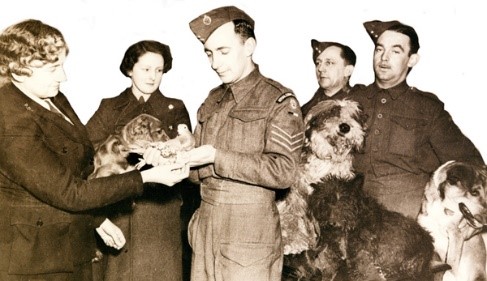
Ages 5-7
Beachcomber delivers the news
Beachcomber was a messenger pigeon who received a medal for his courageous actions during the Dieppe Raid.
- Read about what Beachcomber did and how animals have helped humans in times of war.
- Complete a maze featuring Beachcomber.
- Colour a picture of the Dickin Medal that Beachcomber was awarded.
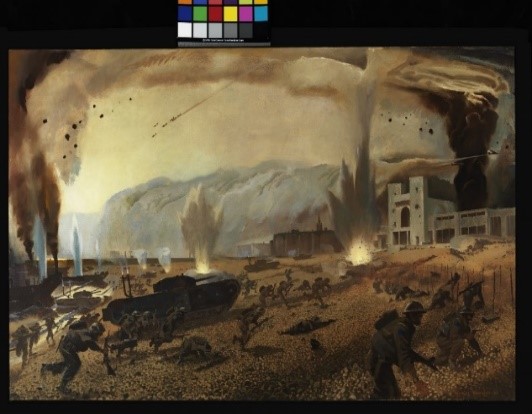
Ages 8-12
A deadly day – The Dieppe Raid
Learning facts about the Dieppe Raid helps us understand the great courage and sacrifice of the Canadians who fought there.
- Read about what happened at Dieppe
- Print the “Deadly day’ cruncher paper activity
- Read the Dieppe Raid historical sheet
- Complete the Dieppe Raid word search
- View the Dieppe Raid photo gallery
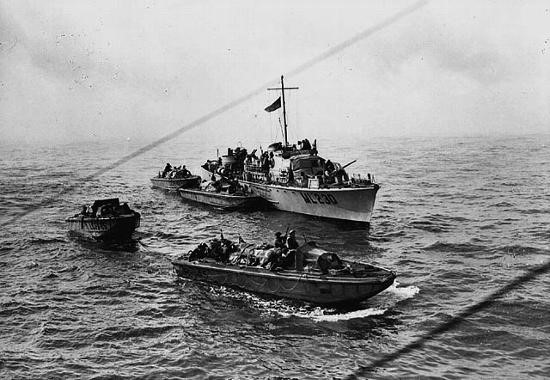
Ages 13-18
Exploring the Dieppe Raid
Thousands of Canadians took part in the Dieppe Raid and our historical resources can help us make sense of why this operation was launched and what went wrong.
- Read an historical sheet about the Dieppe Raid
- Look at a map of Allied Landings at Dieppe
- View the Dieppe Raid photo gallery
- Watch a video of Dieppe Veterans sharing their stories
- Print and complete the Dieppe Raid word search
The Italian Campaign
More than 93,000 Canadians served in Italy from 1943 to 1945. The mountainous terrain of this Mediterranean country – which could be blazing hot in the winter and freezing in the winter – and the fierce enemy resistance they faced made it a very challenging place to fight during the Second World War.

Ages 5-7
The Orphaned Filly
Princess Louise was an injured baby horse that Canadian soldiers rescued in Italy and made the mascot of their regiment.
- Read about Princess Louise and how animals have helped humans in times of war.
- Colour a picture of Princess Louise the orphaned filly.

Ages 8-12
Flowers of Friendship
The people of Italy remember the brave Canadians who helped restore peace to their country. One pair of sisters in the town of Ortona had a very special way of showing their respect.
- Read the “Flowers honour liberty” story.
- Complete the Poppy colouring sheet to learn about this flower that is also a floral symbol of remembrance.

Ages 13-18
Exploring the Italian Campaign
Learning facts about the Italian Campaign helps us better understand the great courage and sacrifice of the Canadians who fought there.
- Read the “War at the Boot” handout to learn more about the Italian Campaign.
- Watch a video of Italian Campaign Veterans sharing their stories.
- Explore our Operation Husky PowerPoint activity to learn about the Allied landings on the Italian island of Sicily in 1943.
- Read Salma Khattab’s reflections on being a youth delegate for the 75th anniversary of the Italian Campaign.
D-Day and the Battle of Normandy
Allied forces came ashore in occupied France during the Second World War on 6 June 1944 – a date that would go down in history as D-Day. Canadian soldiers landed on Juno Beach and would spend the next two-and-a-half months fighting in the Battle of Normandy.

Ages 5-7
D-Day Heroes
Animals have often helped our soldiers in times of war. Many humans have received medals for their courage in battle but animals have also been honoured that way, too.
- Read about a brave Canadian soldier, dog and pigeon who all received medals for their courageous actions during the Battle of Normandy.
- Complete a dot-to-dot activity featuring the Victoria Cross.
- Read about and colour a picture of the Dickin Medal which is awarded to brave animals.

Ages 8-12
Canada House and Juno Beach
One of the first buildings liberated by Canadian troops on D-Day was the a distinctive home in Bernières-sur-Mer, France that has come to be known as “Canada House.”
- Read about the significance of Canada House on 6 June 1944.
- Complete the D-Day and the Battle of Normandy word search.
- Watch the Heritage Minutes D-Day video.
- Watch the Heritage Minutes Juno Beach video.

Ages 13-18
Cracking the Walls of Fortress Europe
Learning facts about the role Canadians played in D-Day and the Battle of Normandy helps us better understand their great courage and sacrifice.
- Read about the events that led up to D-Day and Canadian soldiers’ efforts in the battle.
- Explore the Canadian War Museum’s interactive map “Canada and the Normandy invasion.”
- Watch a video of D-Day Veterans sharing their stories.
- Watch the Heritage Minutes D-Day video.
- Watch the Heritage Minutes Juno Beach video.
- Read Khamael Johnston’s reflections on being a youth delegate for the 75th anniversary of the D-Day and the Battle of Normandy.
The Battle of the Scheldt
In the fall of 1944, the First Canadian Army was tasked with clearing German forces from the shores of the Scheldt estuary in Belgium and the Netherlands. It was a bitter campaign but our soldiers succeeded. Their victory there was an important step in the liberation of Northwest Europe.

Ages 12-18
“Cinderella on the Left” – video viewing activity
Learn why the Allies had to fight the Battle of the Scheldt and how Canadian soldiers overcame incredible hardships to achieve victory.
- Watch the NFB historical film on the Battle of the Scheldt.
- Complete the video question sheet.
- Answers to “Cinderella on the Left” video question sheet.
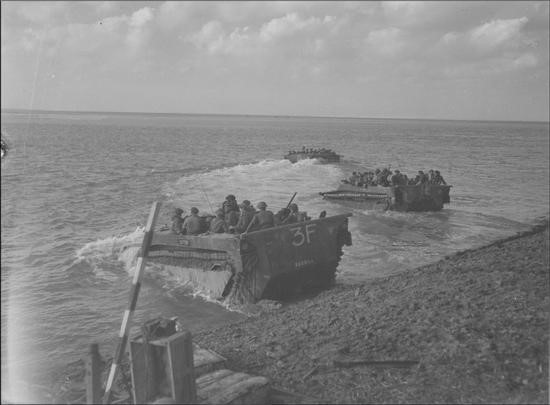
Ages 13-17
Battle of the Scheldt fact quest
Learning facts about this campaign helps us better understand the great courage and sacrifice of the Canadians who fought there.
- Read the Canada Remembers the Battle of the Scheldt historical sheet.
- Complete the Battle of the Scheldt question sheet.
- Answers to the Battle of the Scheldt question sheet.

Ages 12-18
Remembrance dog tags – The Battle of the Scheldt
This dog tag activity is designed to help youth at home ”put a face on remembrance.” Canada’s efforts in the Battle of the Scheldt came at a high cost, with more than 6,300 Canadian soldiers being killed or wounded. Taking a few moments to think about a person who died is a way to honour all those who served.
- Print out and wear the Battle of the Scheldt remembrance dog tags.
The Liberation of the Netherlands and V-E Day
The Liberation of the Netherlands is one of the best-known chapters from our country’s military history. The Canadians who fought to free the Dutch people in 1944–1945 played an important role in the Allied efforts to bring the Second World War to an end in Europe.

Ages 5-7
Flowers of Friendship
Some members of the Dutch royal family lived in the safety of Canada for much of the war. To say thank you, Princess Juliana of the Netherlands gave tens of thousands of tulip bulbs to our country after the conflict ended.
- Read more about this story and the special symbolism of tulips.
- Complete a Tulip colouring sheet and hang it in your window for the neighbours to see.
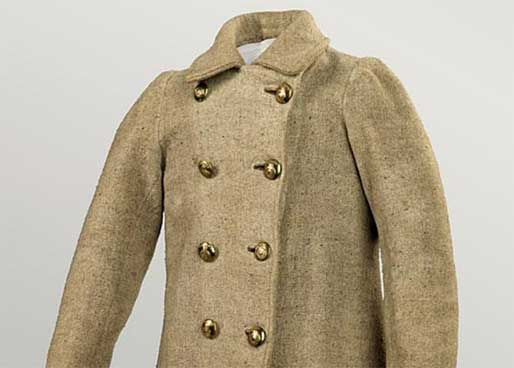
Ages 8-12
A Handmade Gift of Love
Canadian soldiers reached out to the Dutch people in many ways, including one heart-warming episode when a little girl named Sussie Cretier was given a special coat because she had none of her own.
- Read the story of the little Dutch girl and the Canadian soldier who helped her.
- Play a memory game about the coat story using a “cruncher” activity.
- Watch a Virtual Museum of Canada video about this special coat.

Ages 13-17
Liberation of the Netherlands fact quest
Learning facts about this campaign helps us better understand the great courage and sacrifice of the Canadians who fought there.
- Watch the Heroes Remember the Liberation of the Netherlands video.
- Complete the accompanying video question sheet.
- Answers to the video question sheet.
- Read the Canada Remembers the Liberation of the Netherlands historical sheet.
- Complete the accompanying question sheet for the sheet.
- Answers to the historical sheet questions.
Valour in the Pacific – Lieutenant Robert Hampton Gray, VC
Thousands of Canadian airmen served in Asia and the Pacific during the Second World War. They played a variety of roles, from being radar operators to flying with bomber, transport, reconnaissance and fighter squadrons. Lieutenant Robert Hampton Gray was a naval aviator and he would earn the Victoria Cross for his brave actions in the closing days of the Second World War.

Ages 5-7
Robert Hampton Gray dot to dot
Many Canadians received medals for their bravery during the Second World War. The Victoria Cross was the highest award they could receive and 16 of our courageous service members earned one, including Robert Hampton Gray.

Ages 8-12
Hammy the Hero
Robert Hampton “Hammy” Gray was from British Columbia. Learn more about his great bravery and sacrifice in the Second World War and how he earned the Victoria Cross medal.
- Read about Hammy the Hero.
- Print and complete the Hammy the Hero word search.

Ages 12-18
Robert Hampton Gray, VC – Hometown Hero Scavenger Hunt
Robert Hampton Gray was Canada’s last Victoria Cross recipient of the Second World War. He was a true hero.
- Read about Robert Hampton Gray in a Parks Canada Hometown Hero article.
- Test your knowledge with a scavenger hunt.
- Answers to the scavenger hunt questions.
Second World War Remembrance Dog Tags
When you don't have a family connection to someone in the military, it can be difficult to feel personally involved with remembrance. This dog tag activity is designed to help youth “put a face on remembrance” by letting them learn more about an individual Canadian who died in service.

Print and cut out the dog tag of your choice (perhaps selecting an individual from your home province or territory). Here are some subjects you can explore:
- Make holes in the dog tag so it can be worn around the neck on a piece of string and research the fallen service member on the Canadian Virtual War Memorial (CVWM).
- Date modified: